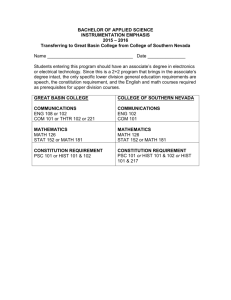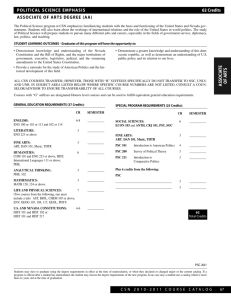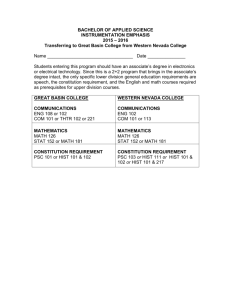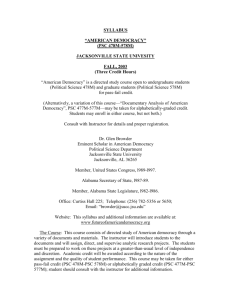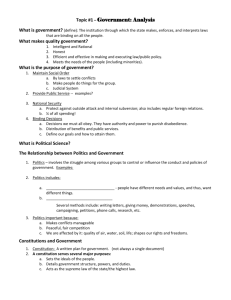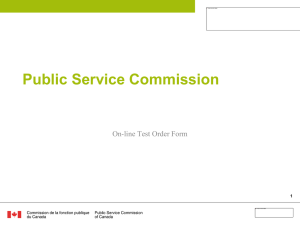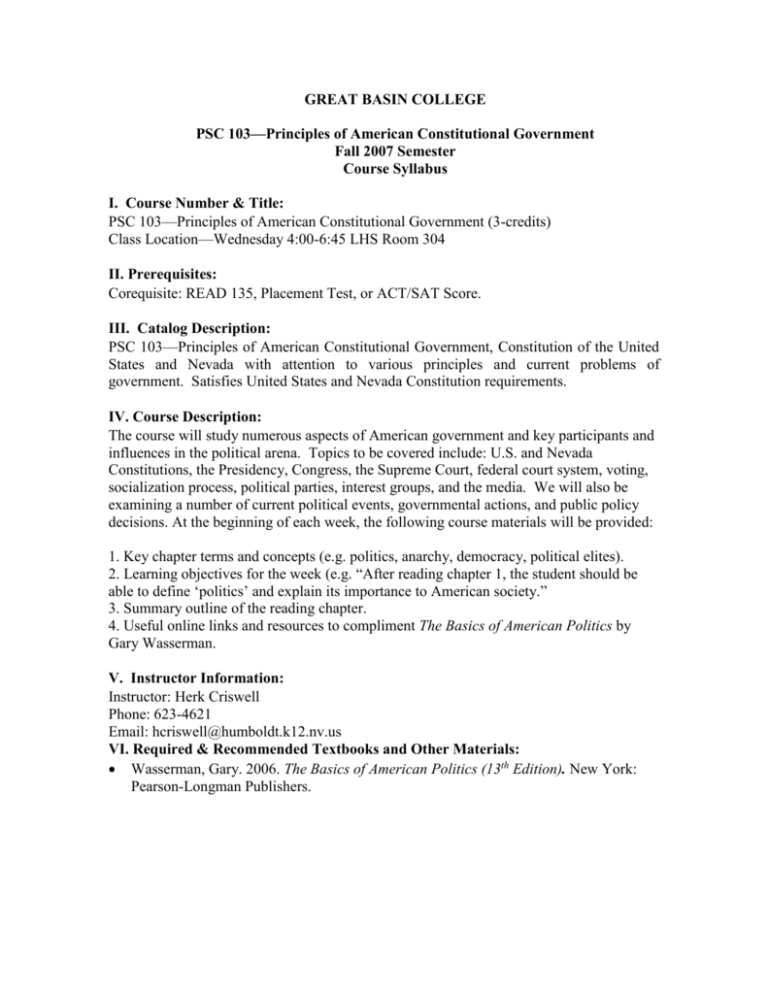
GREAT BASIN COLLEGE
PSC 103—Principles of American Constitutional Government
Fall 2007 Semester
Course Syllabus
I. Course Number & Title:
PSC 103—Principles of American Constitutional Government (3-credits)
Class Location—Wednesday 4:00-6:45 LHS Room 304
II. Prerequisites:
Corequisite: READ 135, Placement Test, or ACT/SAT Score.
III. Catalog Description:
PSC 103—Principles of American Constitutional Government, Constitution of the United
States and Nevada with attention to various principles and current problems of
government. Satisfies United States and Nevada Constitution requirements.
IV. Course Description:
The course will study numerous aspects of American government and key participants and
influences in the political arena. Topics to be covered include: U.S. and Nevada
Constitutions, the Presidency, Congress, the Supreme Court, federal court system, voting,
socialization process, political parties, interest groups, and the media. We will also be
examining a number of current political events, governmental actions, and public policy
decisions. At the beginning of each week, the following course materials will be provided:
1. Key chapter terms and concepts (e.g. politics, anarchy, democracy, political elites).
2. Learning objectives for the week (e.g. “After reading chapter 1, the student should be
able to define ‘politics’ and explain its importance to American society.”
3. Summary outline of the reading chapter.
4. Useful online links and resources to compliment The Basics of American Politics by
Gary Wasserman.
V. Instructor Information:
Instructor: Herk Criswell
Phone: 623-4621
Email: hcriswell@humboldt.k12.nv.us
VI. Required & Recommended Textbooks and Other Materials:
Wasserman, Gary. 2006. The Basics of American Politics (13th Edition). New York:
Pearson-Longman Publishers.
VII. Grading Policy/Point System:
Grades will be based on the following:
Assignment
Three (3) examinations
% of final grade
100%
Grading Scale
Points
Letter
94-100
A
90-93
A87-89
B+
83-86
B
80-82
B77-79
C+
73-76
C
70-72
C67-69
D+
63-66
D
60-62
D<60
F
VIII. Attendance & Class Participation
Attendance is critical to the students’ success in this class. Students will be responsible for
any material covered in classes that were missed. The instructor will not provide any notes
or other materials and the text is meant to reinforce, not replace the lectures.
IX. General Education Objectives & Select Student Learning Outcomes
General education objectives can be referenced on Page 53 of the GBC Catalog. It is the
goal of the faculty at GBC that all students that graduate with either an associate’s or
bachelor’s degree from this institution have had the opportunity presented to them during
their attendance to have acquired ability and awareness with the following objectives:
Objective 1: Communication Skills (Strong)
Communication skills are of critical importance in PSC 103, and the course strongly meets
this objective through a variety of methods. First, students develop acute listening and oral
communication skills. Not only do students have to assimilate a great deal of information
from the historical narrative presented by the instructor (lecture is the basic format of the
course) but also listen effectively to each other as questions are raised and discussion
stimulated by their peers. In these discussions, students hone their oral and written
communication skills as they grapple with new ideas. Second, students sharpen their
reading skills through the required text and short supplemental readings left to the
instructor’s discretion. In the past, supplemental readings have taken the form of an
optional text on Nevada government and politics, but in the future might also include such
things as other books and/or short readings on reserve in the library or on the Internet. The
textbooks require a college-level reading ability to digest the vast amounts of information
and distill it into a usable form. Third, student will learn writing skills. While each
instructor’s assignment vary, this element is always present in some combination of
2
various forms: short free writes, short answer questions that require the ability to know not
only the facts but also the significance of an event or person, large essay questions on the
examinations that require the ability to synthesize vast amounts of material and present it
in a concise essay format, book reviews, and/or formal papers.
Objective 2: Critical Thinking (Moderate)
Critical thinking is a vital process that students must develop in this course. Reasoning and
independent thought are significant parts of this course because students are required to
examine American government and politics and interpret the concepts. In class
discussions, examinations, and papers students are asked to analyze and critically examine
the difficult concepts behind our federal form of government and challenging
Constitutional questions. Many Constitutional questions are ambiguous and have different
interpretations, so students must come to some sort of awareness that for some of the
issues there are no simple answers and that all interpretations are not of equal merit.
Quantitative ability is addressed to a considerable degree in a number of ways. Political
Science relies heavily upon statistical analysis to study issues such as voting patterns,
ethnic character, party representation, public opinion, apportionment of districts, and
polling. Quantitative ability is also addresses to some degree through the broad use of
statistics throughout the course. Scientific understanding is dealt with to some degree in
PSC 103. Scientific discovery and development play a role in this course in a variety of
ways. Most importantly, the Brandeis Brief introduced the use of scientific data into
questions of law and revolutionized legal questions. We take for granted today that science
will be used in the courtroom and Congressional legislative proceedings, but this has not
always been the case. Scientific understanding also involves methodology. In this regard
the course deals explicitly with science, as method, through assignments that require the
explication and testing of hypotheses regarding governmental and political processes.
Objective 3: Personal & Cultural Awareness (Strong)
PSC 103 deals with personal and cultural awareness to a moderate degree. The course
handles the first three elements to a significant degree. Students develop a strong sense of
the individual in society. This entire class is about the creation of our democratic republic
and the Constitution, which guarantees every American civil rights that we perceive as
uniquely American. Students are also urged to interpret the Constitution from different
perspectives (e.g. race, class, religion, education, gender, political party affiliation, interest)
and to understand that different groups of Americans can interpret the Constitution very
differently because of their various experiences and values. This course obviously
engenders a sense of the past through the historical study of the evolution of the
Constitution through its drafting and the amendment process, but it also produces a sense
of accountability and civic responsibility such as the importance of voting, responding to a
jury summons, volunteering in the community, and participating in public hearings. PSC
103 explores ramifications of past Constitutional actions, such as the acceptance of slavery
and later legal segregation of blacks, and evaluates the outcomes. Finally, this course
develops an appreciation of fine arts to a significant degree. Several court decisions have
significantly affected the arts in the U.S., interpreting the boundaries of free expression.
Concerns over freedom of expression are part of the American heritage of civil rights and
are integral to questions of artistic freedom in a democratic society.
3
In addition, political cartoons, arguably an old and important part of American political
culture, continue to play a vital role in American political life. Other artistic modes of
political satire also have a tremendous impact on modern politics, such as music,
television, and the Internet. It is not difficult to see how political satire and commentary
affect us today from the Tonight Show monologue, to the antics of Saturday Night Live
and the Jon Stewart Show, and to more cerebral humor in the satirical music of Mark
Russell. Instructors will obviously deal with this material differently, but political cartoons
are presented in the book. Instructors may introduce complementary materials in lecture,
though audio and video clips, online resources, and in assignments geared toward these
modes of expression.
Objective 4: Personal Wellness (Some Degree)
PSC 103 meets the personal wellness objective to some degree by highlighting public
policies that have created our modern health care system and the welfare state, such as the
creation of Social Security, Medicare, and Medicaid. The class will review the role of the
three branches of government and their involvement and influence in the public
policymaking process.
Objective 5: Technological Understanding (Strong)
PSC 103 fulfills the technological understanding objective due to the emphasis in the
course on using technology as a writing and research tool. There is a plethora of online
resources for American government and politics. Writing assignments are encouraged to be
completed using computer word processing applications and Internet research. In addition,
some instructors use supplemental primary source readings, video clips, and audio clips
that are available on the Internet. By encouraging students to become more computer and
Internet literate, PSC 103 encourages technological understanding.
Student Learning Outcomes
Upon the successful completion of this course, the student will be able to:
Learning Outcome
1. Define “politics” and explain its
importance in American society.
2. List and explain the significance of the
four major constitutional principles.
3. Explain the president’s influence over
public opinion can influence Washington’s
policy agenda.
4. Explain the role of Congress and define
and malapportionment, gerrymandering,
and term limits.
5. Understand the evolution of the Supreme
Court as a policymaker and the civil rights
and liberties of individuals.
6. Itemize the main functions of a political
party.
Measurement
Exam #1
Exam #1
Exam #1
Exam #1
Exam #1
Exam #1
4
7. Review the roles of economic interest
groups and lobbyist.
8. Define the primary characteristics of
Nevada’s political interests and
governmental structure.
Exam #2
Exam #3
X. Course Assignments, Content, & Schedule
There are three examinations that cover The Basics of American Politics and will
compromise 100% of the final grade.
Policy of Academic Integrity
Academic honesty is expected in this course and all college courses. Acts such as cheating
and plagiarism are violations of the Nevada System of Higher Education (NSHE) Code of
Conduct as well as violations of the standards of intellectual dishonesty. All student work
must be original and authentic. Any acts of cheating, copying, and/or plagiarizing are
violations of the NSHE Code of Conduct and will be taken seriously. Students who cheat,
copy another’s work, or plagiarize from the Internet or other sources are subject to
consequences ranging from dismissal from and failure of a class to dismissal from the
college. Tutors are available in the GBC Academic Success Center for assistance with
appropriate documentation and citations.
Student Conduct Policy
Messages, attitudes, or any other form of communication deemed to be outside the bounds
of common decency/civility as judged by common standards of classroom behavior
(determined, as they would be in a regular classroom, by the instructor) will not be
tolerated. GBC and NSHE Code govern the behavior of GBC students, as a member of the
NSHE. Misconduct, as defined and established in the NSHE Code, Title II, Chapter 6,
Section 6.2.2 and the above misconduct as defined by GBC, is subject to Disciplinary
Sanctions as defined by NSHE Code, Title 2.
Class Disruptions
Cell phones and other multimedia devices disrupt class and need to be turned off, stored
away, and out of sight. Text messaging is not allowed. Check with me if there are special
circumstances that require you to have your phone on during class. Coming to class late is
also disruptive. Habitual lateness and leaving the classroom during the lectures is not
acceptable and considered disruptive. Disruptive behavior will result in being removed
from class.
Other Issues
ADA STATEMENT: GBC supports providing equal access for students with disabilities.
An advisor is available to discuss appropriate accommodations with students. Please
contact the ADA Officer (Julie Byrnes) in Elko at 775.753.2271 at your earliest
convenience to request timely and appropriate accommodations.
A. Examinations
The examination dates will be posted and make-ups can be arranged through the instructor.
5
X. PSC 103: Tentative Course Schedule
The following is the schedule for the fall 2007 semester.
Week
Topic
Reading(s)
Wasserman
Chapter 1
Week 1
Aug. 29
Introductions
What is Politics?
Week 2
Sept. 5
Colonialism to Constitutionalism
Chapter 2
Week 3
Sept. 12
The Executive Branch: The Presidency
& Bureaucracy
Chapter 8
Week 4
Sept. 19
The Legislative Branch
Chapter 7
Week 5
Sept. 26
The Judicial Branch
Chapter 10
Week 6
Oct. 3
The Bill of Rights
Chapter 11
Week 7
Oct. 10
The Federal System
Chapter 3
Week 8
Oct. 17
1st Test
Week 9
Oct. 24
No Class
Week 10
Oct. 31
Political Parties and the Electoral
College
Chapters 5
and 6
Week 11
Nov. 7
Nominations and Elections
Chapter 6
Week 12
Nov. 14
Nevada History and Constitution
Week 13
Nov. 21
No Class
Week 14
Nov. 28
2nd Test
Week 15
Dec. 5
Nevada Constitution/City and County
Government
Week 16
Finals
Week
Dec. 12
Final Test
---
6

